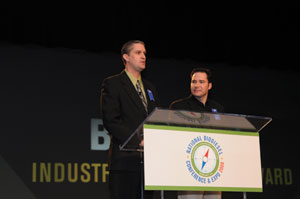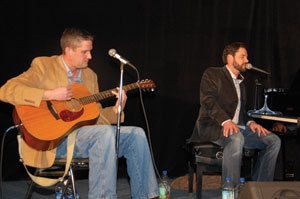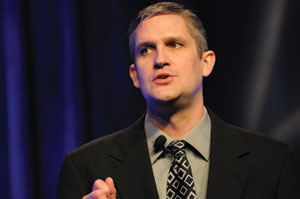Passing the Torch





October 25, 2010
BY Ed Hegland
At the upcoming National Biodiesel Board membership meeting in St. Louis, a new chairman will be taking over to lead the governing board and the industry through the next chapter in the ongoing history of biodiesel in North America. I have been very proud to serve as the board chairman for the past 3 years. My time as chair has been both challenging and rewarding.
When I took over the role of chairman in the fall of 2007, the biodiesel industry was reaching a crescendo of growth and excitement. We celebrated the accomplishment of a new legislative achievement when Congress included a role for biodiesel in the landmark RFS2 in December 2007. A record 700 million gallons were produced that year, nearly 3,800 people attended the annual conference in Orlando, and many, including me, worried that the industry could be going too far too fast. We could not have guessed the multiple challenges that awaited us over the next two years.
My second year as chairman saw out-of-control crude oil and feedstock prices, a closing off of important export markets, and a barrage of coordinated attacks on biofuels, all followed by a series of collapses in the financial, housing, commodities, and stock markets. Why the RFS2 was necessary, even with the tax credit in place, was illustrated in 2008-'09. The RFS2, which was required by Congress to be in place by Jan. 1, 2009, was delayed. Many believed that the best part about 2009 was that it couldn't get any worse. That is when 2010 came along and we learned what it was like to operate with neither the tax credit nor the RFS2 effectively in place.
Darkest Before Dawn
Virtually all new, emerging industries evolve with some degree of inelegant expansion, contraction, consolidation and shakeout before reaching more normal business conditions and cycles. The biodiesel industry was simply unfortunate enough to have experienced an adult dose of it all within a few years. But it is my view that a recovery is on the horizon for this industry. And I believe it will not only be a full recovery, but one that will see a stronger and healthier industry as a result of the struggles we have been through over the past two and a half years.
Without question, the transition from RFS1 to RFS2 in 2010 presented the U.S. biodiesel industry with significant challenges. A variety of factors, including delayed implementation of the program, unanticipated complexity, improper accounting of unused 2008 biodiesel RINs from the RFS1 program, and multiple lawsuits undermined the effectiveness of the RFS2 program in 2010. These uncertainties and barriers should be resolved by the next calendar year and will not confront the program in 2011.
The NBB estimates that this will result in a stable domestic demand for at least 700 million gallons of biodiesel in 2011. And as the RFS2 program matures, the industry will work to responsibly increase the volume requirements beyond the 1 billion gallons of biomass-based diesel that is required in 2012 and beyond.
Members of the media and biofuel opponents continue to try to define biodiesel as a conventional biofuel, which is being increasingly labeled as a bad thing. However, the U.S. EPA has made it clear that biodiesel from a wide range of diverse, domestic feedstocks has been deemed to be an advanced biofuel. Currently biodiesel is the only advanced biofuel that has reached commercialization in the U.S. As America's first advanced biofuel, it is imperative that biodiesel succeed if America is to reach its goal of 21 billion gallons of advanced biofuel by 2022.
Biodiesel will succeed, and I predict 2011 will be the most successful year to date for the industry as we recover from the past two and a half years of pain and move on to a more stable policy framework. NBB and the industry will need to transition its programs in ways that compliment and support this new policy framework and market dynamics. Federal and state policy efforts will remain critically important to the industry, as will the leveraged communications, technical, and educational programs that support their success.
It will also continue to be imperative that the industry remain unified with all stakeholders working with one voice through NBB. It is a source of some satisfaction to me that the industry and all stakeholders have remained unified during my chairmanship, even under some of the most extreme pressures imaginable. I remain committed to this goal of industry unity. I pledge my ongoing service in supporting industry unity in any way.
Finally, I want to express my sincere appreciation for the excellent and hard working individuals who continue to work together to make this industry possible. This includes the producers and marketers who invest their resources and talents to find innovative ways to make better fuels and claw out new markets. It includes feedstock producers such as the soybean farmer leaders who continue to step up with generous and benevolent financial and policy support. And it includes an excellent staff and management team, whose talent and dedication I have always recognized, but have come to appreciate even more these past three years. Thank you again for the opportunity to serve this industry as NBB chairman. I look forward to supporting our next chairman and supporting the industry in any way that I can.
Ed Hegland, chairman, National Biodiesel Board
When I took over the role of chairman in the fall of 2007, the biodiesel industry was reaching a crescendo of growth and excitement. We celebrated the accomplishment of a new legislative achievement when Congress included a role for biodiesel in the landmark RFS2 in December 2007. A record 700 million gallons were produced that year, nearly 3,800 people attended the annual conference in Orlando, and many, including me, worried that the industry could be going too far too fast. We could not have guessed the multiple challenges that awaited us over the next two years.
My second year as chairman saw out-of-control crude oil and feedstock prices, a closing off of important export markets, and a barrage of coordinated attacks on biofuels, all followed by a series of collapses in the financial, housing, commodities, and stock markets. Why the RFS2 was necessary, even with the tax credit in place, was illustrated in 2008-'09. The RFS2, which was required by Congress to be in place by Jan. 1, 2009, was delayed. Many believed that the best part about 2009 was that it couldn't get any worse. That is when 2010 came along and we learned what it was like to operate with neither the tax credit nor the RFS2 effectively in place.
Darkest Before Dawn
Virtually all new, emerging industries evolve with some degree of inelegant expansion, contraction, consolidation and shakeout before reaching more normal business conditions and cycles. The biodiesel industry was simply unfortunate enough to have experienced an adult dose of it all within a few years. But it is my view that a recovery is on the horizon for this industry. And I believe it will not only be a full recovery, but one that will see a stronger and healthier industry as a result of the struggles we have been through over the past two and a half years.
Without question, the transition from RFS1 to RFS2 in 2010 presented the U.S. biodiesel industry with significant challenges. A variety of factors, including delayed implementation of the program, unanticipated complexity, improper accounting of unused 2008 biodiesel RINs from the RFS1 program, and multiple lawsuits undermined the effectiveness of the RFS2 program in 2010. These uncertainties and barriers should be resolved by the next calendar year and will not confront the program in 2011.
The NBB estimates that this will result in a stable domestic demand for at least 700 million gallons of biodiesel in 2011. And as the RFS2 program matures, the industry will work to responsibly increase the volume requirements beyond the 1 billion gallons of biomass-based diesel that is required in 2012 and beyond.
Members of the media and biofuel opponents continue to try to define biodiesel as a conventional biofuel, which is being increasingly labeled as a bad thing. However, the U.S. EPA has made it clear that biodiesel from a wide range of diverse, domestic feedstocks has been deemed to be an advanced biofuel. Currently biodiesel is the only advanced biofuel that has reached commercialization in the U.S. As America's first advanced biofuel, it is imperative that biodiesel succeed if America is to reach its goal of 21 billion gallons of advanced biofuel by 2022.
Biodiesel will succeed, and I predict 2011 will be the most successful year to date for the industry as we recover from the past two and a half years of pain and move on to a more stable policy framework. NBB and the industry will need to transition its programs in ways that compliment and support this new policy framework and market dynamics. Federal and state policy efforts will remain critically important to the industry, as will the leveraged communications, technical, and educational programs that support their success.
It will also continue to be imperative that the industry remain unified with all stakeholders working with one voice through NBB. It is a source of some satisfaction to me that the industry and all stakeholders have remained unified during my chairmanship, even under some of the most extreme pressures imaginable. I remain committed to this goal of industry unity. I pledge my ongoing service in supporting industry unity in any way.
Finally, I want to express my sincere appreciation for the excellent and hard working individuals who continue to work together to make this industry possible. This includes the producers and marketers who invest their resources and talents to find innovative ways to make better fuels and claw out new markets. It includes feedstock producers such as the soybean farmer leaders who continue to step up with generous and benevolent financial and policy support. And it includes an excellent staff and management team, whose talent and dedication I have always recognized, but have come to appreciate even more these past three years. Thank you again for the opportunity to serve this industry as NBB chairman. I look forward to supporting our next chairman and supporting the industry in any way that I can.
Ed Hegland, chairman, National Biodiesel Board
Advertisement
Advertisement
Upcoming Events





